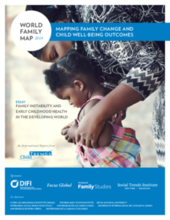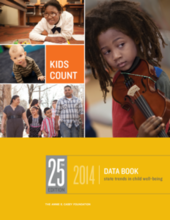Displaying 151 - 160 of 243
This article assesses the evidence-based programs that are most likely to improve key health and well-being outcomes for teenage mothers in the United States and yields a list that reflects the best evidence for efficacy and effectiveness.
In this TED talk, pediatrician Nadine Burke Harris explains how childhood trauma--such as abuse, neglect and parents struggling with mental health or substance abuse--has real, tangible effects on the development of the child's brain. Children who have experienced high levels of trauma and adverse childhood experiences are at triple the risk for heart disease and lung cancer. This is because of the body's stress response system, which is activated repeatedly during childhood by the adversity.
The second annual edition of the World Family Map investigates how family characteristics affect children’s healthy development around the globe and includes a new essay focusing on union stability and early childhood health in developing countries.
This issue of the US-based journal Future of Children, entitled ‘Helping Parents, Helping Children: Two-Generation Mechanisms,’ reviews intervention programs for children and families of low socioeconomic status and on the mechanisms of child development that those intervention programs are trying to influence.
This article provide one of the most comprehensive assessments of physical growth, biological markers of growth and nutrition, and general behavioral development, in this case conducted on 286 children under 3 years of age living in 10 institutions in Kazakhstan that were globally deficient.
Infant Mental Health Journal has published an important Special Issue on Global Research, Practice, and Policy Issues in the Care of Infants and Young Children at Risk. This article provides a case study of a project to improve the health, safety, and development of children birth to 6 years old in a large orphanage in Nepal.
This section is the first of three in Program P: A Manual for Engaging Men in Fatherhood, Caregiving, and Maternal and Child Health.
This final section of Program P: A Manual for Engaging Men in Fatherhood, Caregiving, and Maternal and Child Health is designed for health sector workers and activists who are interested in developing and implementing social-awareness-raising activities in their community that promote the benefits of active fatherhood as a way to achieve gender equality, benefit children, and improve the lives of men and women.
The KidsCount Data Book for 2014 is produced by the Annie E. Casey Foundation. It is the 25th edition of this data book, which measures state trends and demographics in child wellbeing in the United States.
This book focuses on, and reviews, a selection of laws related to the rights of children in South Africa.





